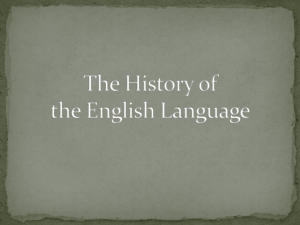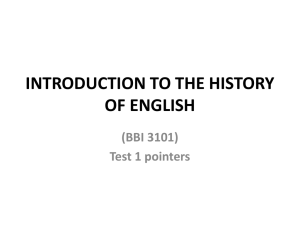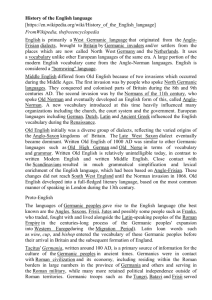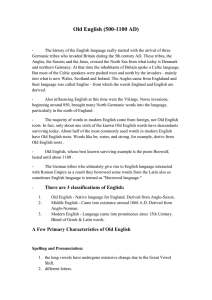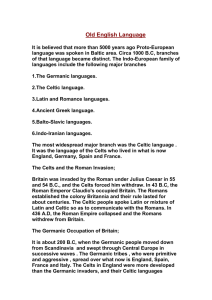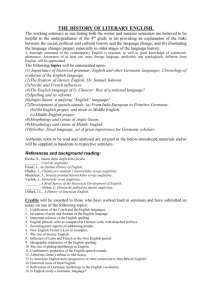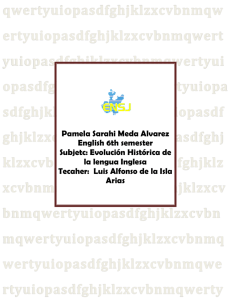English
advertisement
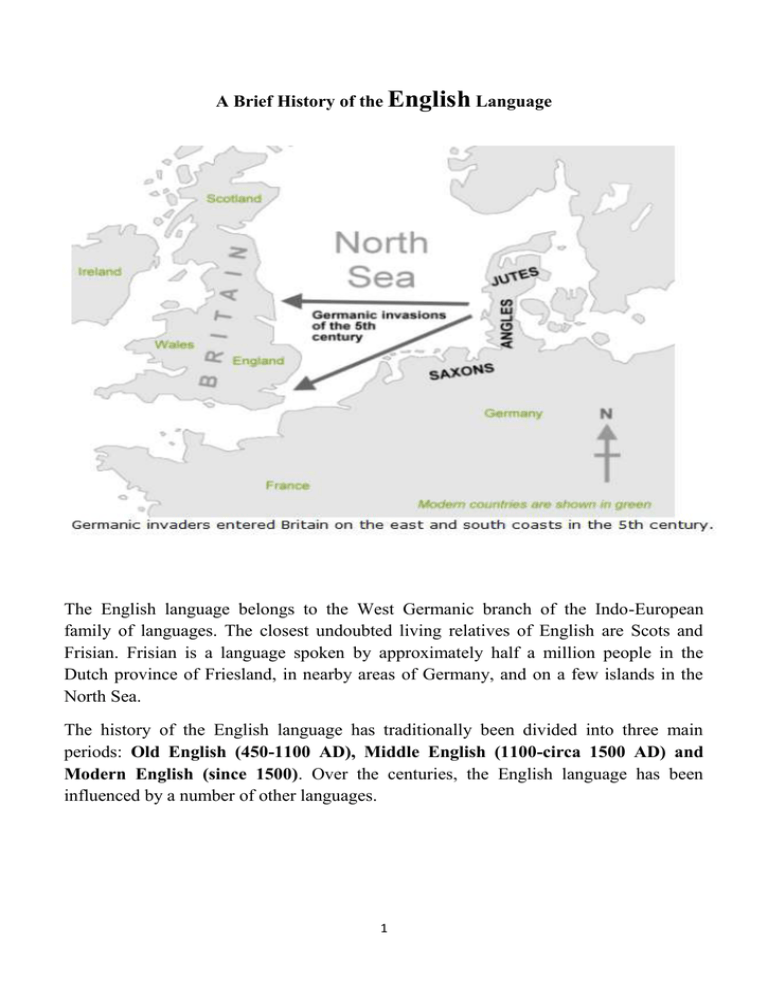
A Brief History of the English Language The English language belongs to the West Germanic branch of the Indo-European family of languages. The closest undoubted living relatives of English are Scots and Frisian. Frisian is a language spoken by approximately half a million people in the Dutch province of Friesland, in nearby areas of Germany, and on a few islands in the North Sea. The history of the English language has traditionally been divided into three main periods: Old English (450-1100 AD), Middle English (1100-circa 1500 AD) and Modern English (since 1500). Over the centuries, the English language has been influenced by a number of other languages. 1 Old English (450 - 1100 AD): During the 5th Century AD three Germanic tribes (Saxons, Angles, and Jutes) came to the British Isles from various parts of northwest Germany as well as Denmark. These tribes were warlike and pushed out most of the original, Celtic-speaking inhabitants from England into Scotland, Wales, and Cornwall. One group migrated to the Brittany Coast of France where their descendants still speak the Celtic Language of Breton today. When the Anglo-Saxons first came to England from northern Germany (Saxony) in the fifth and sixth centuries, they brought their language with them. It is a Germanic language and has some fundamental similarities to Modern German Through the years, the Saxons, Angles and Jutes mixed their different Germanic dialects. This group of dialects forms what linguists refer to as Old English or AngloSaxon. The word "English" was in Old English "Englisc", and that comes from the name of the Angles. The Angles were named from Engle, their land of origin. Before the Saxons the language spoken in what is now England was a mixture of Latin and various Celtic languages which were spoken before the Romans came to Britain (54-5BC). The Romans brought Latin to Britain, which was part of the Roman Empire for over 400 years. Many of the words passed on from this era are those coined by Roman merchants and soldiers. These include win (wine), candel (candle), belt (belt), weall (wall). ("Language Timeline", The British Library Board) The influence of Celtic upon Old English was slight. In fact, very few Celtic words have lived on in the English language. But many of place and river names have Celtic origins: Kent, York, Dover, Cumberland, Thames, Avon, Trent, Severn. The arrival of St. Augustine in 597 and the introduction of Christianity into Saxon England brought more Latin words into the English language. They were mostly concerned with the naming of Church dignitaries, ceremonies, etc. Some, such as church, bishop, baptism, monk, eucharist and presbyter came indirectly through Latin from the Greek. Around 878 AD Danes and Norsemen, also called Vikings, invaded the country and English got many Norse words into the language, particularly in the north of England. The Vikings, being Scandinavian, spoke a language (Old Norse) which, in origin at least, was just as Germanic as Old English. 2 Words derived from Norse include: sky, egg, cake, skin, leg, window (wind eye), husband, fellow, skill, anger, flat, odd, ugly, get, give, take, raise, call, die, they, their, them. ("The Origin and History of the English Language", Kryss Katsiavriades) Several written works have survived from the Old English period. The most famous is a heroic epic poem called "Beowulf". It is the oldest known English poem and it is notable for its length - 3,183 lines. Experts say "Beowulf" was written in Britain more than one thousand years ago. The name of the person who wrote it is unknown. Middle English (1100-circa 1500 AD): After William the Conqueror, the Duke of Normandy, invaded and conquered England in 1066 AD with his armies and became king, he brought his nobles, who spoke French, to be the new government. The Old French took over as the language of the court, administration, and culture. Latin was mostly used for written language, especially that of the Church. Meanwhile, The English language, as the language of the now lower class, was considered a vulgar tongue. By about 1200, England and France had split. English changed a lot, because it was mostly being spoken instead of written for about 300 years. The use of Old English came back, but with many French words added. This language is called Middle English. Most of the words embedded in the English vocabulary are words of power, such as crown, castle, court, parliament, army, mansion, gown, beauty, banquet, art, poet, romance, duke, servant, peasant, traitor and governor. ("Language Timeline", The British Library Board) Because the English underclass cooked for the Norman upper class, the words for most domestic animals are English (ox, cow, calf, sheep, swine, deer) while the words for the meats derived from them are French (beef, veal, mutton, pork, bacon, venison). ("The Origin and History of the English Language", Kryss Katsiavriades) The Middle English is also characterized for the beginning of the Great Vowel Shift. It was a massive sound change affecting the long vowels of English. Basically, the long vowels shifted upwards; that is, a vowel that used to be pronounced in one place in the mouth would be pronounced in a different place, higher up in the mouth. The Great Vowel Shift occurred during the fifteenth to eighteenth centuries. 3 The most famous example of Middle English is Chaucer's "The Canterbury Tales", a collection of stories about a group of thirty people who travel as pilgrims to Canterbury, England. The portraits that he paints in his Tales give us an idea of what life was like in fourteenth century England. Modern English (1500 to the present): Modern English developed after William Caxton established his printing press at Westminster Abbey in 1476. Johann Gutenberg invented the printing press in Germany around 1450, but Caxton set up England's first press. The Bible and some valuable manuscripts were printed. The invention of the printing press made books available to more people. The books became cheaper and more people learned to read. Printing also brought standardization to English. By the time of Shakespeare's writings (1592-1616), the language had become clearly recognizable as Modern English. There were three big developments in the world at the beginning of Modern English period: the Renaissance, the Industrial Revolution, and the British Colonialism. It was during the English Renaissance that most of the words from Greek and Latin entered English. This period in English cultural history (early 16th century to the early 17th century) is sometimes referred to as "the age of Shakespeare" or "the Elizabethan era", taking the name of the English Renaissance's most famous author and most important monarch, respectively. During the reign of Queen Elizabeth I there was an explosion of culture in the form of support of the arts, popularization of the printing press, and massive amounts of sea travel. England began the Industrial Revolution (18th century) and this had also an effect on the development of the language as new words had to be invented or existing ones modified to cope with the rapid changes in technology. New technical words were added to the vocabulary as inventors designed various products and machinery. These words were named after the inventor or given the name of their choice (trains, engine, pulleys, combustion, electricity, telephone, telegraph, camera etc). 4 Britain was an Empire for 200 years between the 18th and 20th centuries and English language continued to change as the British Empire moved across the world - to the USA, Australia, New Zealand, India, Asia and Africa. They sent people to settle and live in their conquered places and as settlers interacted with natives, new words were added to the English vocabulary. For example, 'kangaroo' and 'boomerang' are native Australian Aborigine words, 'juggernaut' and 'turban' came from India. (See more borrowings from different languages.) English continues to change and develop, with hundreds of new words arriving every year. But even with all the borrowings from many other languages the heart of the English language remains the Anglo-Saxon of Old English. The grammar of English is also distinctly Germanic - three genders (he, she and it) and a simple set of verb tenses. 5 Old English: historical events After the Anglo-Saxon invasion, the Germanic language displaced the indigenous Brythonic languages and Latin in most of the areas of Great Britain that later became England. The original Celtic languages remained in parts of Scotland, Wales and Cornwall (where Cornish was spoken into the 19th century), although large numbers of compound Celtic-Germanic place names survive, hinting at early language mixing.[3]Latin also remained in these areas as the language of the Celtic Church and of higher education for the nobility. Latin was later to be reintroduced to England by missionaries from both the Celtic and Roman churches, and it would, in time, have a major impact on English. What is now called Old English emerged over time out of the many dialects and languages of the colonising tribes.[4] Even then, Old English continued to exhibit local variation, the remnants of which continue to be found in dialects of Modern English.[4] The most famous surviving work from the Old English period is the epic poem Beowulf composed by an unknown poet. Old English varied widely from modern Standard English. Native English speakers today would find Old English unintelligible without studying it as a separate language. Nevertheless, English remains a Germanic language, and approximately half of the most commonly used words in Modern English have Old English roots. The words be, strong and water, for example, derive from Old English. Many non-standard dialects such as Scots and Northumbrian English have retained features of Old English in vocabulary and pronunciation.[5] Old English was spoken until some time in the 12th or 13th century.[6][7] In the tenth and eleventh centuries, Old English was strongly influenced by the North Germanic language Old Norse, spoken by the Norsemen who invaded and settled mainly in the North East of England (see Jórvík and Danelaw). The Anglo-Saxons and the Scandinavians spoke related languages from different branches of the Germanic family; many of their lexical roots were the same or similar, although their grammars were more divergent. The Germanic language of the Old English-speaking inhabitants was influenced by extensive contact with Norse colonizers, resulting perhaps in cases of morphological simplification of Old English, including the loss of grammatical gender and explicitly marked case (with the notable exception of the pronouns). English borrowed approximately two thousand lexical items from Old Norse, including anger, bag, both, hit, law, leg, same, skill, sky, take, and many others, possibly even including the pronounthey.[8] 6 The introduction of Christianity late in the sixth century encouraged the addition of over 400 Latin loan words, such as priest, paper, and school, and fewer Greek loan words.[9] The Old English period formally ended some time after the Norman conquest (starting in 1066 AD), when the language was influenced to an even greater extent by the Normans, who spoke a French dialect called Old Norman. The use of Anglo-Saxon to describe a merging of Anglian and Saxon languages and cultures is a relatively modern development. 7 Middle English: historical background For centuries following the Norman Conquest in 1066, the Norman kings and highranking nobles spoke one of the French langues d'oïl, that we call Anglo-Norman, a variety of Old Norman used in England and to some extent elsewhere in the British Isles during the Anglo-Norman period and originating from a northern langue d'oïl dialect. Merchants and lower-ranked nobles were often bilingual in Anglo-Norman and English, whilst English continued to be the language of the common people. Middle English was influenced by both Anglo-Norman and, later, Anglo-French (see characteristics of the Anglo-Norman language). Even after the decline of Norman-French, standard French retained the status of a formal or prestige language—as with most of Europe during the period—and had a significant influence on the language, which is visible in Modern English today (see English language word origins and List of English words of French origin). A tendency for French-derived words to have more formal connotations has continued to the present day. For example, most modern English speakers consider a "cordial reception" (from French) to be more formal than a "hearty welcome" (from Germanic). Another example is the rare construction of the words for animals being separate from the words for their meat, e.g., beef and pork (from the French bœuf and porc) being the products of "cows" and "pigs"—animals with Germanic names. English was also influenced by the Celtic languages it was displacing, especially the Brittonic substrate, most notably with the introduction of the continuous aspect—a feature found in many modern languages but developed earlier and more thoroughly in English.[10] While the Anglo-Saxon Chronicle continued until 1154, most other literature from this period was in Old Norman or Latin. A large number of Norman words were taken into Old English, with many doubling for Old English words. The Norman influence is the hallmark of the linguistic shifts in English over the period of time following the invasion, producing what is now referred to as Middle English. English literature reappeared after 1200, when a changing political climate and the decline in Anglo-Norman made it more respectable. The Provisions of Oxford, released in 1258, was the first English government document to be published in the English language after the Norman Conquest. In 1362, Edward III became the first king to address Parliament in English. By the end of the century, even the royal court had 8 switched to English. Anglo-Norman remained in use in limited circles somewhat longer, but it had ceased to be a living language. Geoffrey Chaucer is the most famous writer from the Middle English period, and The Canterbury Tales is his best-known work. Although the spelling of Chaucer's English varies from that of Modern English, his works can be read with minimal assistance. The English language changed enormously during the Middle English period, both in grammar and in vocabulary. While Old English is a heavily inflected language, an overall diminishing of grammatical endings occurred in Middle English. Grammar distinctions were lost as many noun and adjective endings were leveled to -e. The older plural noun marker -en largely gave way to -s, and grammatical gender was discarded. Approximately 10,000 French (and Norman) loan words entered Middle English, particularly terms associated with government, church, law, the military, fashion, and food.[11] English spelling was also influenced by Norman in this period, with the /θ/and /ð/ sounds being spelled th rather than with the Old English letters þ (thorn) and ð (eth), which did not exist in Norman. These letters remain in the modern Icelandic alphabet, having been borrowed from Old English via Western Norwegian. 9
